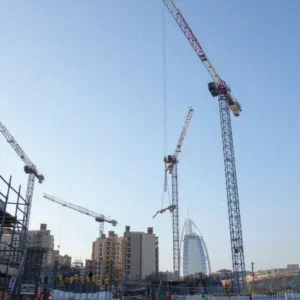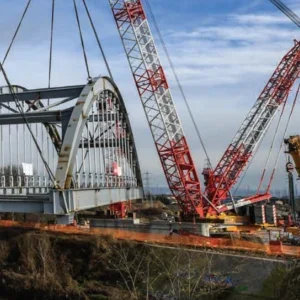Fil Filipov is one of the more energetic figures in the crane industry. He needs to be. As president of Terex Lifting he is responsible, at the latest count, for 21 manufacturing plants and five distribution centres in nine different countries. The latest addition to the Terex family is the Australian mobile crane manufacturer Franna, acquired in December. With crawlers, towers, telehandlers and industrial cranes now firmly bedded into the Terex product range, only knuckle boom loaders are conspicuous by their absence.
As a concession to the extraordinary amount of travelling he has to do, Filipov has moved his base from the factory in Conway, South Carolina, to downtown Chicago, the city where he first settled as an impoverished immigrant more than 30 years ago. The idea of a central office was previously anathema to him. (In his view, “you either make something, sell something or you’re an overhead”).
Not only does Filipov have the energy to pursue relentless growth through acquisition, he also has the self-confidence to relish the fact that so many other industry leaders are willing him to fail. Terex has grown fast on the kind of financing that demands continued growth to keep the ship afloat. The empire building is driven by necessity, not ego.
Terex is a bubble waiting to burst, certain doubters believe. “Oh yeah,” – Filipov replies, as he takes the turnover of Terex Lifting past a billion dollars and plots his next acquisition – “you just watch me!” To date, the Terex story (since the arrival in 1993 of Filipov and his boss, group CEO Ron De Feo) has been a financial success that Wall Street was slow to spot. There have been doubts about the quality of certain product lines and the product support that Terex was able to offer. But competitive pricing has always ensured a market for Terex product and now Ed Samera has been given special responsibility by Filipov to address the quality and product support criticisms. In December, 20 more field service personnel were added for North American customers.
However, more recently there have been signs of difficulties – 20% of employees were laid off at the Conway crane manufacturing plant in the USA in January because of a 25% fall in orders. And, prior to that, the closure was announced of the Milwaukee scissor lift factory. Is Filipov losing his touch? Of the scissor factory closure, Filipov says: “It’s being smart, knowing when to get out.” All scissor lift manufacturers are having problems in North America, he says, and Terex’s scissor range was relatively basic as the product was not a forte of either Simon or Marklift, the two acquisitions that got Terex into the aerial work platform business in the USA.
More significant than the factory closure is Filipov’s gloomy prognosis for the crane business in North America this year. “It’s kind of winding down,” he says. “Our projections are flat to a slight decrease in the next 8 to 12 months. The rest of the world will improve a little.” North American manufacturers have enjoyed about five years of unchecked growth. A downturn is inevitable at some stage. Few were expecting it just yet, however.
Other US crane manufacturers – and not just Grove – are also showing signs of starting to feel the chill of a market slowdown.
Filipov’s detractors, including those who accuse him of undermining the distribution system that is a cornerstone of the world crane industry, will gloat smugly should Terex struggle in any downturn that lies ahead.
The charasmatic Filipov likes to portray himself as an industry outsider whose mission is to shake up the industry by treating cranes as just another commodity good. But he has been at Terex for seven years now, and was previously four years with JI Case and 15 years with International Harvester – hardly an outsider to the heavy equipment industry. And now that he is taking as much interest in product support as he always did in stripping costs out of manufacturing, he has moved away slightly from the pure commodity approach.
Being an outsider, however, is more a state of mind than a state of being, and in that respect Filipov is every inch the maverick. Those who have not yet heard the gospel according to Fil, which comes down to working hard and reducing everything to its simplest parts, will get the chance to read all about it in a book he is planning to bring out this year, called Filosophies. He describes it as part-biography, recalling his escape from his native Bulgaria where he spent close to a year as a political prisoner, his arrival at the age of 17 at a refugee camp in Greece, and his subsequent emigration to America. But it will also contain many of his pithy observations on life and business. “It’ll be kind of provocative,” he promises.
Filipov appears to be motivated by deal making and turning around ailing businesses. If not exactly fire sales, many Terex acquisitions have been companies experiencing hard times. The time may rapidly be approaching when the scope for takeovers in the crane manufacturing industry diminishes. At such a time, do not be surprised to see Filipov move on to apply his talents in an entirely different manufacturing industry which is also characterised by too many small manufacturers chasing too little business.






